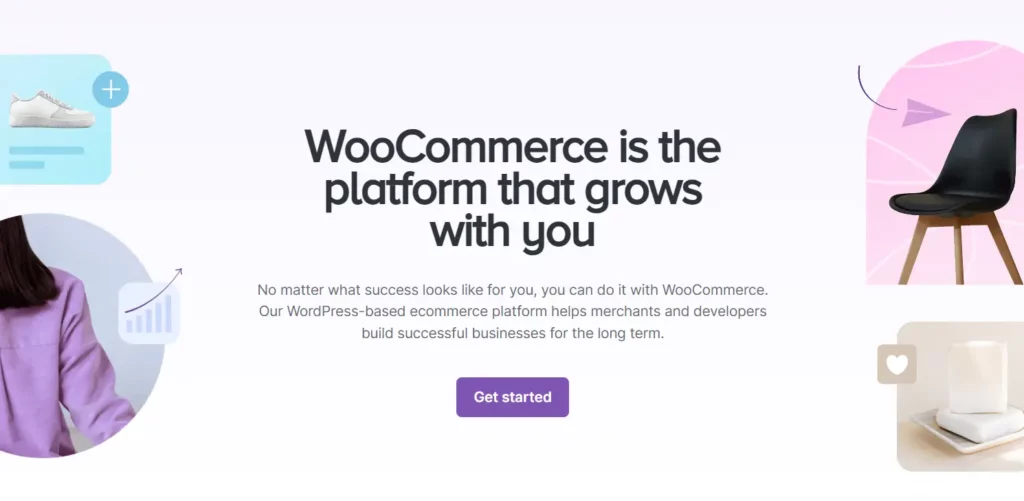Why do you need an online store?
Starting an online store presents a compelling opportunity for entrepreneurs. It allows for reaching a broader audience beyond geographical limitations, operating 24/7 without the constraints of traditional store hours. Online platforms offer lower startup and operational costs compared to physical stores, making them financially accessible. Additionally, consumer behavior is increasingly shifting towards online shopping, providing a growing market. An online store can also be integrated with advanced analytics to understand customer preferences better and optimize marketing strategies. This digital approach enables businesses to adapt quickly to market trends and customer needs, enhancing the potential for growth and profitability.
Contents
- Why need to use a ready-made platform?
- Choosing the right platform
- Shopify vs Woocommerce comparison table
- Other factors to consider
- Frequently asked questions
Why need to use ready-made platforms for your e-commerce store?
- Cost Efficiency: Ready-made platforms like Shopify or WooCommerce are generally less expensive to set up compared to custom solutions. They eliminate the need for extensive development time and the associated costs.
- Quick Setup: These platforms are designed for easy setup, allowing businesses to launch their online stores quickly. With templates and user-friendly interfaces, even users with minimal technical skills can set up and manage their stores efficiently.
- Reliability and Security: Established platforms have robust security measures in place and are regularly updated to handle various threats, ensuring that business and customer data are well-protected.
- Scalability: As a business grows, these platforms can scale to accommodate increased traffic and sales, often without needing significant changes to the infrastructure.
- Support and Resources: Ready-made platforms come with customer support, documentation, community forums, and other resources, making it easier to troubleshoot issues and find guidance.
- Built-in Features and Integrations: They include essential features like payment gateways, SEO tools, and marketing capabilities, and offer integrations with other services, reducing the need for custom development.
Choosing the right platform is essential for the success of your online business, with Shopify and WooCommerce being two of the top contenders. Each platform serves different needs and offers unique features, which can make choosing between them quite challenging. Let’s explore the differences between Shopify and WooCommerce, focusing on aspects like customization, ease of use, pricing, and other critical factors. If you are not sure about which is the best platform for your online store you can contact a company like Seamedia.
Ease of Use
WooCommerce is a plugin for WordPress, the leading content management system on the internet. It offers significant customization options but demands more technical expertise during setup. Users need to manage hosting, install WordPress, and then add and configure the WooCommerce plugin. Despite the initial setup complexity, WooCommerce offers a familiar interface for WordPress users and robust features for store management.
Shopify stands out for its user-friendliness. It is a fully hosted solution, so users don’t have to manage software, updates, or backups. Shopify’s intuitive interface, enhanced by drag-and-drop functionality and clear navigation, makes it easy for beginners to launch and manage an online store efficiently.
Verdict: Shopify is ideal for beginners seeking a hassle-free setup, while WooCommerce will appeal to those familiar with WordPress, who prefer a more customizable platform.

Customization Options
Shopify provides a variety of professionally designed themes and templates that users can tailor to their brand. Although customization is somewhat limited compared to WooCommerce, Shopify’s extensive app store enables users to enhance functionality with thousands of apps and integrations, from marketing to customer service.
WooCommerce offers unparalleled customization capabilities due to its integration with WordPress. Users have complete control over their site’s design and functionality, accessing a vast array of themes and plugins. This open-source solution also allows developers to modify code, making it possible to customize the platform extensively according to specific needs.
Verdict: WooCommerce leads in customization, offering greater flexibility for users who desire full control over their online store’s look and functions.
Pricing
Shopify uses a subscription model, with plans starting from $24 per month for the basic setup, scaling up to premium plans for larger businesses. This includes essential features necessary for running an online store, though transaction fees apply if using payment gateways other than Shopify Payments.
WooCommerce is free as an open-source plugin, but running a store will require payments for hosting, domain registration, and premium themes or plugins. This might be more cost-effective initially but can become expensive as the business grows and more features are needed.
Verdict: WooCommerce might seem more budget-friendly due to its no-cost entry, but Shopify’s all-inclusive subscription model could provide better value in the long run, considering it handles hosting and maintenance.

Here’s a comparison table highlighting key differences between WooCommerce and Shopify:
| Feature | WooCommerce | Shopify |
|---|---|---|
| Base Cost | Free to install; costs accrue for hosting, domains, and additional plugins. | Subscription based; starts at $29/month for the basic plan. |
| Ease of Use | Requires some technical knowledge to set up and manage, especially with WordPress. | User-friendly with an intuitive dashboard, making it easy for beginners. |
| Customization | Highly customizable; access to thousands of plugins and themes. Full control over the code. | Limited customization options compared to WooCommerce; extensive range of apps and integrations available. |
| Hosting | Self-hosted; requires setup and ongoing maintenance of hosting. | Fully hosted; Shopify takes care of maintenance, software updates, and security. |
| Security | User-managed security; responsibility for backups, updates, and security lies with the user. | High-level security included; Shopify handles security compliance and data protection. |
| Scalability | Scalable with the right hosting plan; may require additional optimization for high traffic. | Easily scalable; Shopify manages infrastructure to handle increased traffic and sales. |
| Payment Options | Supports various payment gateways; additional costs might apply depending on the gateway. | Integrated payment solution with Shopify Payments; additional fees for using external gateways. |
| Support | Community-driven support; access to forums and a large number of developers. | 24/7 support through live chat, email, and phone; extensive documentation available. |
| SEO Capabilities | Strong SEO capabilities through WordPress; more control over SEO elements. | Decent SEO features; somewhat limited due to platform constraints. |
| Market Access | Integrations and plugins available for marketplaces and social media. | Built-in tools and integrations for selling on various channels, including social media and online marketplaces. |

Other Factors to Consider
Scalability: Both platforms are designed to grow with your business. Shopify offers easier scalability solutions since it manages the hosting and infrastructure, ensuring performance remains optimal as traffic increases.
Support and Documentation: Shopify excels with its 24/7 customer support and comprehensive resources. WooCommerce also provides good documentation and community support, but users might depend more on third-party developers for technical help.
SEO and Marketing: Both platforms are equipped with robust SEO and marketing tools. However, WooCommerce might have a slight edge in SEO capabilities due to its deep integration with WordPress.
Choosing the Right Platform: FAQ
- What are the main differences in cost between Shopify and WooCommerce?
- Shopify operates on a subscription model with various tiers that include hosting and SSL certificates. In contrast, WooCommerce is a free plugin for WordPress, but you will need to pay for hosting, domain, and potentially for additional plugins and themes.
- Which platform offers more design flexibility, Shopify or WooCommerce?
- WooCommerce generally offers more flexibility as it allows for extensive customization through access to source code and a wide range of plugins. Shopify, while less flexible in terms of design, provides a user-friendly interface with a selection of customizable themes.
- How do Shopify and WooCommerce compare in terms of ease of use?
- Shopify is often considered easier to use for beginners due to its all-in-one, managed service that includes hosting and security. WooCommerce, while requiring a bit more setup initially, integrates with WordPress, offering a familiar environment for those who have used WordPress before.
- Which platform is better for SEO: Shopify or WooCommerce?
- Both platforms are strong in SEO capabilities. However, WooCommerce has a slight advantage due to its integration with WordPress, which is renowned for its SEO effectiveness and additional plugins that can enhance this further.
- Can I migrate my existing e-commerce store to either Shopify or WooCommerce easily?
- Both platforms support migrations, but the process can vary in complexity. Shopify offers migration services directly or via third-party apps. WooCommerce might require more manual effort, especially if you are migrating from a non-WordPress platform.
- Which platform is better for scaling up my e-commerce business?
- Both Shopify and WooCommerce are scalable, but in different ways. Shopify handles scaling seamlessly with higher-tier plans that accommodate increased products and traffic. WooCommerce offers scalability through the use of various plugins and managed WordPress hosting solutions, giving you more control over how you scale.
If you are interested in trying Shopify, you can create your free trial Shopify account by clicking here
Conclusion
The choice between Shopify and WooCommerce should be based on your specific needs, preferences, and technical skills. Shopify is great for those who value ease and comprehensive support, while WooCommerce is suited for those who prioritize flexibility and control. Evaluate both platforms to see which aligns best with your e-commerce objectives. At Seamedia, we’re ready to guide and support you through your e-commerce journey.
How can Seamedia help you?
At Seamedia, we specialize in expertly crafting Shopify and WooCommerce stores, fine-tuning pages, and implementing strategic enhancements to optimize performance. Are you looking for an agency to elevate your store’s operations? Look no further! Our global clientele trusts us to focus on their success. For more information on how we can assist in advancing your business, please contact us today.





